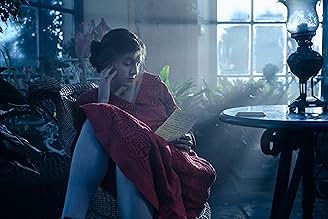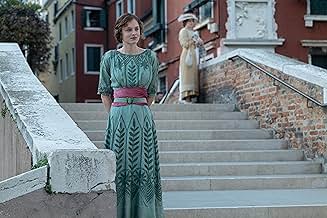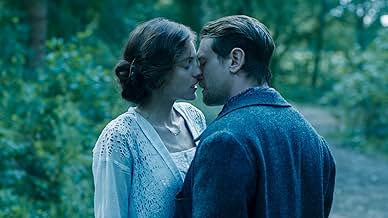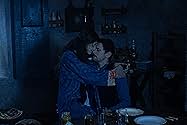Desenamorada de su esposo, una mujer se involucra en un tórrido romance con un empleado de su mansión.Desenamorada de su esposo, una mujer se involucra en un tórrido romance con un empleado de su mansión.Desenamorada de su esposo, una mujer se involucra en un tórrido romance con un empleado de su mansión.
- Dirección
- Guionistas
- Elenco
- Premios
- 2 nominaciones en total
- Dirección
- Guionistas
- Todo el elenco y el equipo
- Producción, taquilla y más en IMDbPro
Opiniones destacadas
This Netflix dud ruined my favorite novel. First of all, I hated the camera work. Cold hues of blues throughout, in a story about sensual love? Then it was wildly miscast and mis-directed. Corrin was too skinny, neither she nor Mellors exuded any sensuality, and had no chemistry. A young anorexic filmed in hues of blue in a story of sexual passion? Very misguided. No buildup of tension between Connie and Mellors at the onset of their relationship. Then, when they go at it, Connie looks like she is 14 and Mellors like he is 16. Clifford is a cardboard character.
The wit of the novel was put in the grinder. The costumes were too modern and 'on the nose' (see the red day dress). The dialogues mediocre, the sex scenes either cringing or just dull. So the directing was just terrible - and I am surprised at the high ratings offered by the supposed critics. Even more surprised with the fact that a team of Creative Execs at Netflix greenlit such a dud on the basis of the well-known actors.
And what is the matter with all the anorexic young British actresses? In the Crown season 5, the new Diana (played by Elisabeth Debicki is also anorexic and about 20 pounds skinnier than the rea Diana). When Corrin takes off her top and looks at herself and her naked breasts in the mirror she looks like freshly out of Auschwitz. I imagine the casting directors are pressuring young actresses to be so skinny, but someone should stop this fad.
So, no emotion for story and characters until like the last 15 mins.
The wit of the novel was put in the grinder. The costumes were too modern and 'on the nose' (see the red day dress). The dialogues mediocre, the sex scenes either cringing or just dull. So the directing was just terrible - and I am surprised at the high ratings offered by the supposed critics. Even more surprised with the fact that a team of Creative Execs at Netflix greenlit such a dud on the basis of the well-known actors.
And what is the matter with all the anorexic young British actresses? In the Crown season 5, the new Diana (played by Elisabeth Debicki is also anorexic and about 20 pounds skinnier than the rea Diana). When Corrin takes off her top and looks at herself and her naked breasts in the mirror she looks like freshly out of Auschwitz. I imagine the casting directors are pressuring young actresses to be so skinny, but someone should stop this fad.
So, no emotion for story and characters until like the last 15 mins.
I truly do not understand why this movie is so reviled. I have read all D. H. Lawrence and most people fail (or do not wish to) understand that his main purpose was the study of social inequities and their devastating effect on British Society in the early 20th Century. All is work tends to illustrate that. Lady Chatterley's Lover is a prime example of that beyond the scandal around its publication. It is the first time that I truly see this aspect in an adaptation as well as the sex not being necessarily pretty and romantic. Their relationship is the closest one to the book I have ever seen. So haters pass your way, the cast, direction, cinematography everything rings true.
First let me say that it's been 45-50 years since I read Lady Chatterley's Lover in college.....and other than the title and a few names, I don't remember anything about it. Thus, I can't say if this film has anything in common with the book. As I watched the film unfold, I struggled for any "recognition" of scenes and situations, without success. But that said, I fail to understand the "hate" that some reviewers are giving this film. Perhaps it's NOT like the classic D. H. Lawrence book, but taken on its own, it has some real appeal. I can't recall if the book had such "modern" woman aspects, and the film is occasionally a bit tedious in its "blame the Patriarchy" for everything......but that's simply to be expected in film making today. With its copious nudity, it certainly meets today's "Netflix" standards of having women-centric stories, and enough female flesh to hold the men's interest. The quality of acting and photography are actually outstanding. (although the extreme use of the color purple in lighting and clothing became very jarring at times) So, regardless as to how it compares to the source book, this film is very enjoyable and entertaining, both for male and female viewers. Please don't believe the critics who say otherwise, and give it a view......I think you will appreciate it.
Sometimes a movie is more than the sum of its parts. Not this latest LCL. Here the parts stubbornly refuse to come together (pun intended).
In a culture ruled by intellect and divided by class, Lawrence advocated for connection and the body. But sex, for Lawrence, is not solely about climax; it is also a vehicle of self-discovery, a way to transcend class.
Unfortunately, the film demonstrates little of Lawrence's penetration. Instead, Lady Chatterley and her story languish under a frigid ideological lens.
Thus Corrin's Lady Chatterley can best be described as 'disembodied.' The director is more interested in her as an idea than a flesh-and-blood person. Her face registers, but what is missing is the experience of her awkward, boyish body. Honestly, if she manifested a new consciousness in the way she moved and held herself, I sure didn't notice it.
Similarly, she arouses no physical chemistry in a fine-looking O'Connell, who in turn does capture the accent, but not the ecstasy. Their nude scenes together, devitalized by the wan colors of the photography, are the reverse of joyously sensuous.
Speaking of which, has Venice ever been less sensuous?
In the end, the film makes the viewer an intellectual observer, not a partaker. The film's elements, though in ever such good taste, lack that lush, unashamed appeal to the senses that would have immersed us in Connie's and Mellor's awakening to what it is to be woman and man.
Qualified recommendation: despite its shortcomings, a springboard into a more personal, transgressive, and passionate imaginative experience.
In a culture ruled by intellect and divided by class, Lawrence advocated for connection and the body. But sex, for Lawrence, is not solely about climax; it is also a vehicle of self-discovery, a way to transcend class.
Unfortunately, the film demonstrates little of Lawrence's penetration. Instead, Lady Chatterley and her story languish under a frigid ideological lens.
Thus Corrin's Lady Chatterley can best be described as 'disembodied.' The director is more interested in her as an idea than a flesh-and-blood person. Her face registers, but what is missing is the experience of her awkward, boyish body. Honestly, if she manifested a new consciousness in the way she moved and held herself, I sure didn't notice it.
Similarly, she arouses no physical chemistry in a fine-looking O'Connell, who in turn does capture the accent, but not the ecstasy. Their nude scenes together, devitalized by the wan colors of the photography, are the reverse of joyously sensuous.
Speaking of which, has Venice ever been less sensuous?
In the end, the film makes the viewer an intellectual observer, not a partaker. The film's elements, though in ever such good taste, lack that lush, unashamed appeal to the senses that would have immersed us in Connie's and Mellor's awakening to what it is to be woman and man.
Qualified recommendation: despite its shortcomings, a springboard into a more personal, transgressive, and passionate imaginative experience.
It looks good. The acting of the 2 leads is convincing and yet there is no heat, no chemistry and no peril in what they may loose.
As with so much of Lawrence's adaptations, they capture the text, the story, but not the spirit of the author.
It fails to capture some of the subplots that would make this a real telling of the book. Lord Chatterley is a caring thoughtful man one moment and ridiculous stereotype the next. Hilda, caring when Connie is ill and yet cold and shrill later. Mrs Bolton was not developed in this adaptation, possibly because of time.
It's worth a watch. Netflix are starting to do more highbrow movies with Rebecca coming last year. This is better than that. Let's hope it continues.
As with so much of Lawrence's adaptations, they capture the text, the story, but not the spirit of the author.
It fails to capture some of the subplots that would make this a real telling of the book. Lord Chatterley is a caring thoughtful man one moment and ridiculous stereotype the next. Hilda, caring when Connie is ill and yet cold and shrill later. Mrs Bolton was not developed in this adaptation, possibly because of time.
It's worth a watch. Netflix are starting to do more highbrow movies with Rebecca coming last year. This is better than that. Let's hope it continues.
¿Sabías que…?
- TriviaActor Matthew Duckett has cerebral palsy which affects his gait. For the early scenes before Clifford is wounded, shots were composed and framed in such a way that his disability was not noticeable.
- ErroresDuring the romantic encounter in the forest he rips her dress down, but when she puts the dress back on there is no damage.
Selecciones populares
Inicia sesión para calificar y agrega a la lista de videos para obtener recomendaciones personalizadas
- How long is Lady Chatterley's Lover?Con tecnología de Alexa
Detalles
- Fecha de lanzamiento
- Países de origen
- Sitio oficial
- Idioma
- También se conoce como
- Lady Chatterley's Lover
- Locaciones de filmación
- Productoras
- Ver más créditos de la compañía en IMDbPro
- Tiempo de ejecución2 horas 6 minutos
- Color
- Mezcla de sonido
- Relación de aspecto
- 1.85 : 1
Contribuir a esta página
Sugiere una edición o agrega el contenido que falta































